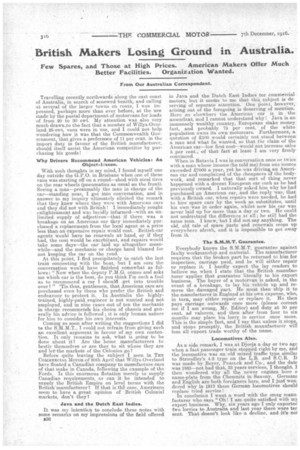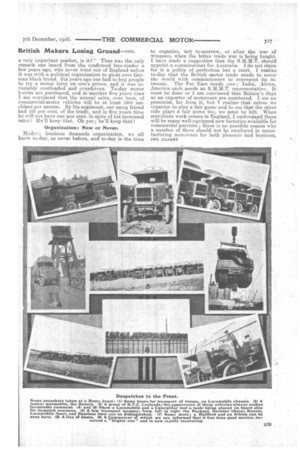British Makers Losing Ground in Australia.
Page 10

Page 11

If you've noticed an error in this article please click here to report it so we can fix it.
Few Spares, and Those at High Prices. American Makers Offer Much Better Facilities. Organization Wanted.
From Our Australian Correspondent.
Travelling recently northwards along the east coast of Australia, in search of aenewed health, and calling at several of the larger towns en route, I was impressed, perhaps more than ever before, at the use made by the postal department of motorvans for loads of from 20 to 30 cwt. My attention was also very flinch drawn.to the fact that a number of Willys-Overland 25-cwt. vans were in use, and I could not help wondering how it was that the Commonwealth Government, that gives a prefereme of 11 per cent. in the i import duty n favour of the British manufacturer, should itself assist the American competitor by purchasing his goods !
Why Drivers Recommend American Vehicles: An Obj e ct-1 z sson.
With such thoughts in my mind, I found myself one day outside the G.P.O. in Brisbane when one of these vans was starting off on a round—shod with steel tires on the rear wheels (pneumatics as usual on the front). Seeing a man—presumably the man in charge of the car—standing near, I got into conversation, and in answer to my inquiry ultimately elicited the remark that they knew where they were with American cars and they did not with British' I immediately sought enlightenment and was lucidly infarmed—with an unlimited supply of adjectives—that if there was a breakage on an American car they immediately purchased a replacement from the local agent at a price less than an expensive repair would cost. British-car agents would have no renewals at hand, or if they had, the cost would be exorbitant, and repairs would take some days—the car laid up altogether meanwhile—and the mechanic or charge hand blamed for not keeping the car on the road. .
At this point, I fled precipitately to catch the last train connecting with the boat, but I am sure the conversation would have finished somewhat as follows: "Now when the deputy P.M.G. comes and asks me which car is the best, do you think I'm such a fool as to recommend a car I should get into trouble over ? " 'Tis thus, gentlemen, that American cars are purchased even by those who prefer the British and endeavour to protect it. In Australia the highlytrained, highly-paid engineer is not wanted and not employed, and in nine cases out of ten the mechanic in charge recommends his choice of chassis and generally his advice is followed ; it is only human nature for him to consider his own interests.
Coming so soon after writing the suggestions I did te the S.M.M.T., I could not refrain from giving such an excellent argument in favour of my own contention. It only remains to ask, what is going to be done about it? Are the home .m,anufa,cturers to bestir themselves or are they to sit where they are and let the markets of the Calonies go ? Before quite leaving the subject I seen in THE COMMERCIAL MOTOR of 20th April that Willys-Overland have floated a Canadian company to manufacture cars of that make in Canada, following the example of the Fords. Is this enormous flotation merely to supply Canadian requirements, or can it be intended to supply the British Empire on level terms with the British'ma,nufacturer ? If that is the' case, Americans seem to have a great opinion of British Colonial markets, don't they?
Java and the Dutch East Indies.
It was my intention to conclude these notes with some remarks on my impressions of the field offered B36 in Java and the Dutch East Indies tor commercial motors, but it seems to me that this subject is deserving of separate attention. One point, however, arising out of the foregoing is deserving of mention. Here as elsewhere the American car is in the aseendaat and I cannot understand why! Java is an immensely wealthy Country, Europeans Make money fast, and probably 75 per cent, of the white population owns its own motorcars. Furthermore, a question of 2100 would certainly not stand between a man and what he wanted, so that the claim of the American car—low first cost—would not increase sales 5 per cent., of that fact at least I am very firmly convinced.
When in Batavia I was in conversation once or twice with a man whose income (he told me) from one "source exceeded 27000 a year, yet he-was driving an American car and complained of the cheapness of the bodywork, and remarked that that sort of thing never happened with a decent European car such as he had previously owned. I naturally asked him why he had purchased an American car, and the reply was, that with a British car, when repairs were needed, he had to hire spare cars by the week as substitutes, until his own was in order again, whilst now his car was never laid up for more than a day or two. He could not understand the difference at all ; he still had the same man. I knew, but I did not say anything. The old, old tale of spare parts and renewals crops up everywhere afresh, and it is impossible to get away from it.
The S.M.M.T. Guarantee.
Everybody knows the S.M.M.T. guarantee against faulty workmanship and material. The manufacturer requires that the broken part be returned to him for inspection, carriage paid, and he will either repair or replace it. I hardly expect the lay readers to believe me when I state that the British manufacturer applies that guarantee literally to his export business. The buyer of a motorvan is asked, in the event of a breakage, to lay his vehicle up and remove the damaged part. He must then ship it to the manufacturer in England at his own expense, who, in turn, may either repair or replace it. He then pays carriage outwards once more (please correct me if I am wrong, Mr. Editor) and duty at 30 per cent, ad valorem, and then after from four to six months may place his lorry in service once more. This is the simple fact, and I say that unless it stops, and stops promptly, the British manufacturer will lose all export trade worthy of the name.
Locomotives Also.
As a side remark, I was at Djocja a day or two age when a fast passenger train stopped right by me, and the locomotive was an old mixed traffic type sinailaa to Stroudley's 4-2 type on the L.B. and S.C.R. It was made by Beyer, Peacock and Co., and the date was 1883—not bad that, 33 years services, I thought. 3 then wondered why all the newer engines bore a name-plate from the Chemnitz in Saxony. German, and English are both foreigners here, and I just wondered why in 1913 these German locomotives should replace tried service !
In conclusion I want a word with the smug menufaeturer who says " Oh ! I am quite satisfied with in3,
export business. Why, six years ago I only exporte two lorries to Australia and last year there were ter sent. That doesn't look like a decline, and it's noi
a very important market, is it?" Thati was the only remark one heard from the confirmed free-trader a few years ago, who never went out of England unless it was with a political organization to gloat over German black bread. Six years ago one had to beg people to try a motor lorry on one's prices, and it was invariably overloaded and overdriven. To-day motor lorries are purchased, and in another five years time I am convinced that the annual sales, over here, of commercial-motor vehicles will be at least 1500 machines per annum. By his argument, our smug friend had 100 per cent, of the trade, and in five years time he will not have one per cent, in spite of his increased sales ! He'll keep that. Oh yes ; he'll keep that I Organization: Now or Never.
Moder:. business demands organization, we all know to-day, as never before, and to-day is the time
to organize, not to-morrow, or after the war of weapons, when the bitter trade war is being fought. I have made a suggestion that the S.M.M.T. should appoint a commissioner for Australia. I do not claim for it a policy of perfection but, a start. I realize to-day that the British motor trade needs to cover the world with commissioners to represent its interests. The Far East needs one ; India, Africa, America each needs an S.11.111.T. representative. It must be done or I am convinced that Britain's days as an exporter of motorcars are numbered. I am no pessimist, far from it, but I realize-that unless we organize to play a fair game and to see that the other side .plays a fair game too, we must be left. When munitions work ceases in England, I understand there will be many well-equipped new factories available for commercial pursuits there is no possible reason why
• a number of them should not be employed in manufacturing motorcars for both pleasure and business,






















